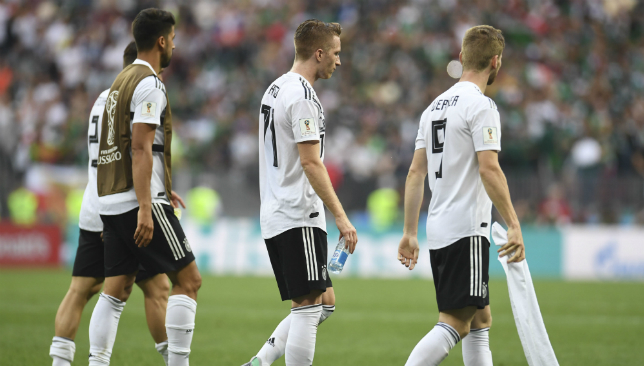
The signs were there.
Germany had a five-match winless run heading into their final pre-World Cup friendly against Saudi Arabia – their worst run since 1931. A narrow, unconvincing win against the Saudis did not mask the deficiencies that had been laid bare. Losing to Mexico in their tournament opener may be the shock result of the World Cup so far, but it was coming.
They may have dominated the game – 66% possession, 20 chances created to Mexico’s 12, 26 shots to 13 – but in truth, Mexico, who created the more gilt-edged opportunities to score, should have won this game more handily, by a scoreline that could have matched Spain’s embarrassing 5-1 loss in their opening game as reigning champions at the last World Cup.
At the moment, Die Mannschaft are playing like a self-indulgent side, drunk on its own excesses. It was difficult not to see an air of complacency in their loss. Forward Thomas Muller confirmed as much, saying earlier this week that he and his teammates “took things a bit too lightly” after their warm-up games, assuming that they’d be able to flip the proverbial switch once the tournament proper came.
Well, the tournament proper came, and the switch wasn’t flipped. Now Germany are in danger of becoming the third straight reigning champions to get knocked out in the group stages, after Italy in 2010 and Spain in 2014.
Spain are a troubling blueprint for Germany. In 2014 it seemed that Germans had mastered the Spanish plan, mirroring the dominant, suffocating possession and passing that had led the Spaniards to the 2010 title but adding a level of thrust and attacking impetus that Spain had missed. Vicente del Bosque’s side infamously won each of their knockout games in 2010 by a 1-0 scoreline.
But 2018 Germany are looking more like 2014 Spain. Heavy favourites to repeat, expecting that the exact same plan that made them champions four years earlier will work again, that whatever other teams have done in response, they’ll be good enough to beat it.
Mexico put paid to that notion, and in all too predictable a way.
The loss bore far too many similarities to Spain’s against the Netherlands from four years ago, notably in how easily Germany were torn apart on the counter, but also in how shellshocked a champion team were by what was happening to them. It was as if they couldn’t believe that they were losing, or that they weren’t able to turn things around.
Spain would follow up their 5-1 reverse to the Dutch with a 2-0 loss to Chile that knocked them out – which offers another parallel that Germany won’t find comforting.
Their next opponents are Sweden, a side with a sense of unity and a battling spirit that harks back to Chile’s from 2014. The Swedes may not have the sprinkling of stardust that Alexis Sanchez provided for Chile – although in Emil Forsberg, they certainly have a player capable of doing Germany damage – but their path to the World Cup should be enough of an indication that they will not be easy to beat.
They beat Italy to qualify for this summer’s tournament – and beating a side of the Azzurri’s pedigree over a two-legged playoff, not just a one-off knockout game, is a sign that this team has what it takes to beat Germany.
Thomas Muller has urged Germany to stop losing the ball: "They often come from being over-motivated and thinking too well. The mix of patience and determination is extremely important. Against Sweden we expect a defensive block. We must not get too impatient." #GER #SWE
— Ronan Murphy (@swearimnotpaul) June 20, 2018
Manager Joachim Low has a lot to do to ensure his champions avoid that fate, starting with getting the players who make his side such a feared squad on paper to step up. Foremost among them is Toni Kroos, who against Mexico was not the player who ran Germany’s midfield in 2014, nor the star who has been such a crucial part of Real Madrid‘s recent successes.
Perhaps bringing in Ilkay Gundogan in for Sami Khedira, who offered nothing in attack and was poor defensively, would add more incisiveness to the side as a whole, as well as bringing the best out of Kroos, similar to how Croatia’s Luka Modric does at Madrid.
Playing Muller as a striker ahead of Timo Werner, who looked out of his depth on his World Cup debut, is another potential solution. Up front, Muller can pull defenders out of position in a way that he can’t when deployed as a winger. That in turn will lead to more space for Marco Reus, who could come in for Werner, Mesut Ozil, Julian Draxler – who at times was the only player who looked like making an impact against Mexico.
Ozil is the other player who needs to find his best. Some of the criticism the Arsenal man receives is unfair – it went unnoticed, for example, that he was the only attacking player who got back to help defend during Mexico’s goal, even if he was then beaten too easily by goalscorer Hirving Lozano. But there’s no arguing that it has been far too long since he dazzled in a high-stakes game. There have even been calls for him to be dropped.
It’s unlikely that Low heeds those calls. But he needs his star players to live up to their billing on Saturday against Sweden.
Otherwise, like Spain and Italy before them, Germany are close to bidding an unexpectedly early farewell to their World Cup.